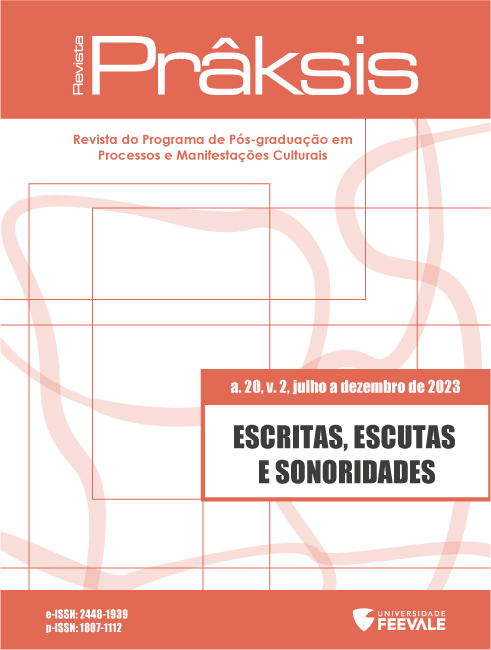LA SONORIDAD COMO ESTRATEGIA DIDÁCTICA PARA FOMENTAR LA ESCRITURA CON SENTIDO EN ESTUDIANTES INMIGRANTES
DOI:
https://doi.org/10.25112/rpr.v2.3444Keywords:
Writing teaching, Meaningful writing, Didactic strategy, SonorityAbstract
Writing is considered a complex process that requires the implementation of various strategies by teachers. One of them is sonority, a resource that allows an approach to the creation of meanings. In this context, the objective of the research was to analyze the perceptions of language specialist teachers regarding the implications of sonority as a didactic strategy to promote meaningful writing in immigrant students. The study had a qualitative design with a descriptive approach. The sample consisted of 30 language teachers of basic and secondary education, selected through the intentional non-probabilistic sampling strategy. The main findings show that sonority is an important strategy to consolidate learning in immigrant students; in the classroom, activate significant experiences for the development of writing. Third, this strategy strengthens values that accompany learning to write. One of the projections of this research is to deepen the knowledge of the contributions of sonority to overcome problems related to linguistic expression and motivation for learning.
References
BORGES, A.; RICHIT, A. Desenvolvimento de saberes docentes para o ensino de música nos anos iniciais. Cadernos De Pesquisa, São Paulo, v. 50, n. 176, p. 555-574, 2020. Disponível em: https://doi.org/10.1590/198053146782. Acesso em: 18 jul. 2023.
BRICEÑO, CH.; DURÁN, E. Interacción de las inteligencias lingüística y musical y su impacto sobre la adquisición de una lengua extranjera. Revista angolana de ciências, Malanje, v. 3, n. 1, p. 54-70, 2021. Disponível em: https://doi.org/10.54580/R0301.04. Acesso em: 18 jul. 2023.
CALLEJAS, C.; RUGELES, C. Cuando leer y escribir conspiran con los sentidos y las palabras se sumergen en la música el texto escrito cobra vida. Zona próxima, Barranquilla, n. 33, p. 125-145, 2020. Disponível em: https://doi.org/10.14482/zp.33.372.87. Acesso em: 18 jul. 2023.
COVRE, J. F.; AIELLO, A. L. R.; GIL, M. S. de A. Effects of a musical interventions program on the language of toddlers. SciELO Preprints, 2022. Disponível em: https://doi.org/10.1590/SciELOPreprints.4243. Acesso em: 18 jul. 2023.
CRESWELL, J. W. Research Design: Qualitative, Quantitative, and Mixed Methods Approaches (4ª ed.). Thousand Oaks, CA: Sage Publications, 2014. 273 p.
CUSTODIO, N.; CANO-CAMPOS, M. Efectos de la música sobre las funciones cognitivas. Revista de Neuro-psiquiatría, Lima, v. 80, n. 1, p. 60-69, 2017. Disponível em: http://dx.doi.org/10.20453/rnp.v80i1.3060. Acesso em: 18 jul. 2023.
D’AURIA-TARDELI, D.; TAKIGAMI ALVÉS, V. Afetividade na prática do professor na escola da infância. Revista Prâksis, [S. l.], v. 1, p. 55-78, 2021. Disponível em: https://doi.org/10.25112/rpr.v1.2749. Acesso em: 18 jul. 2023.
DEGRAVE, P. Music in the Foreign Language Classroom: How and Why? Journal of Language Teaching and Research, [S. l.], v. 10, n. 3, p. 412-420, 2019. Disponível em: http://dx.doi.org/10.17507/jltr.1003.02. Acesso em: 18 jul. 2023.
FONTORBES, J.; GRANIE, A.; LORDA, M. Comprender y sentir un territorio de trabajo y de vida a partir de imágenes, sonidos y emociones. La película de investigación y la interdisciplinariedad: otras maneras de conocimiento. Revista Universitaria de Geografía, Bahía Blanca, v. 31, n. 2, p. 163-182, 2022.
GIBBS, G. El análisis de datos cualitativos en investigación cualitativa. Madrid: Morata, 2012. 199 p.
JIMÉNEZ, F.; AGUILERA, M.; VALDÉS, R.; HERNÁNDEZ, M. Migración y escuela: Análisis documental en torno a la incorporación de inmigrantes al sistema educativo chileno. Psicoperspectivas, Valparaíso, v. 16, n. 1, p. 105-116, 2017. http://dx.doi.org/10.5027/psicoperspectivas-vol16-issue1-fulltext-940. Acesso em: 18 jul. 2023.
MILES, M. B.; HUBERMAN, A. M.; SALDAÑA, J. Qualitative Data Analysis: A Methods Sourcebook (3ª ed.). Thousand Oaks, CA: Sage Publications, 2013. 408 p.
OLDONI, C.; DE FREITAS, E. C. Da multiplicidade, do multiletramento à construção do sentido: gêneros multimodais e práticas discursivas. Revista Prâksis, [S. l.], v. 2, p. 16-28, 2017. Disponível em: https://doi.org/10.25112/rpr.v2i0.1251. Acesso em: 18 jul. 2023.
PAVEZ-SOTO, I.; ORTIZ-LÓPEZ, J.; JARA, P.; OLGUÍN, C.; DOMAICA, A. Infancia haitiana migrante en Chile: barreras y oportunidades en el proceso de escolarización. EntreDiversidades. Revista de Ciencias Sociales y Humanidades, Chiapas, v. 11, p. 71-97, 2018. Disponível em: https://doi.org/10.31644/ED.11.2018.a03. Acesso em: 18 jul. 2023.
POBLETE, R. El trabajo con la diversidad desde el currículo en escuelas con presencia de niños y niñas migrantes: estudio de casos en escuelas de Santiago de Chile. Perfiles Educativos, Ciudad de México, v. 40, n. 159, 51-65, 2018. Disponível em: https://doi.org/10.22201/iisue.24486167e.2018.159.58202. Acesso em: 18 jul. 2023.
ROMÁN, D. Migración inclusiva en Chile, un desafío educativo vigente. Revista latinoamericana de educación inclusiva, Santiago, v. 15, n. 1, p. 157-172, 2021. Disponível em: http://dx.doi.org/10.4067/S0718-73782021000100157
SARAIVA, J.; KESSLER, D.; STUMM, F.; FAES, J.; GOMES, I.; GIROTTO, J.; GREGÓRIO, L.; DA ROS, P.; LÚCIA, R.; DUPRAT, R.;
WILIRICH, T.; BACKES, S. Poemas e canções e o envolvimento crítico de leitores. Revista Prâksis, [S. l.], v. 2, p. 287-306, 2022. Disponível em: https://doi.org/10.25112/rpr.v2.2732. Acesso em: 18 jul. 2023.
TOVAR, M.; BUSTOS, R. Diversidad lingüística en el aula multicultural: Nudos críticos en escuelas de frontera. Revista de ciencia y tecnología de América, v. 47, n. 11, p. 513-519, 2022.
VERA-ÁLVAREZ, N.; RIQUELME-SANDOVAL, S. Tensiones culturales en adolescentes migrantes residentes en Chile. Revista Latinoamericana de Ciencias Sociales, Niñez y Juventud, Manizales, v. 20, n. 1, p. 328-348, 2022. Disponível em: https://doi.org/10.11600/rlcsnj.20.1.5079. Acesso em: 18 jul. 2023.
Downloads
Published
How to Cite
Issue
Section
License
Copyright (c) 2023 Claudine Benoit

This work is licensed under a Creative Commons Attribution 4.0 International License.
• Os autores mantêm os direitos autorais e concedem à revista o direito de primeira publicação com o trabalho licenciado sob a Licença Creative Commons - Attribution 4.0 International (CC BY 4.0).
• Os autores são estimulados a publicar e distribuir seu trabalho online (ex.: em repositórios institucionais ou na sua página pessoal), pois isso pode aumentar o impacto e a citação do trabalho publicado.


